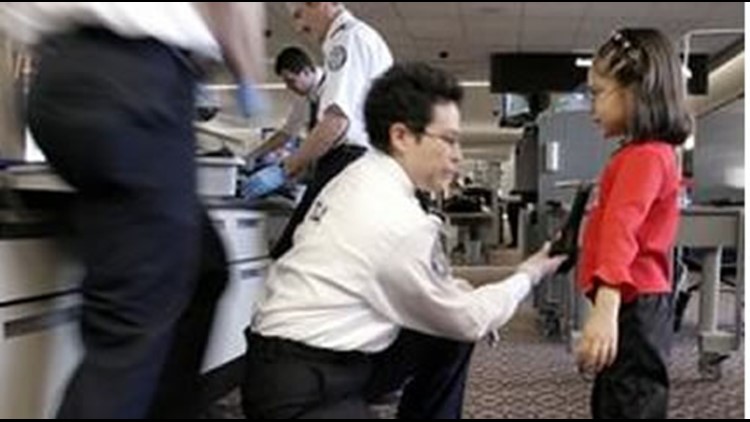WASHINGTON (AP) -- Children 12 years old and younger soon will no longer be required to remove their shoes at airport security checkpoints, Homeland Security Secretary Janet Napolitano told Congress on Tuesday. The policy also includes other ways to screen young children without resorting to a pat-down that involves touching private areas on the body.
Napolitano said during a Senate hearing on the terror threat to the U.S. that the changes would be rolled out in the coming months. But the Transportation Security Administration later said the changes would be rolled out in weeks rather than months.
Napolitano said there may be some exceptions to keep airport security unpredictable. Terrorists have plotted to use children as suicide bombers, and some children still may be required to remove their shoes to keep security random.
'There will always be some unpredictability built into the system, and there will always be random checks even for groups that we are looking at differently, such as children,' she said.
Many travelers have complained that the TSA does not use common sense when it screens all air travelers the same way, including young children and the elderly. Criticism escalated last year when the government began using a pat-down more invasive than what had been used in the past, one that involves screeners feeling a traveler's genital and breast areas.
Earlier this year, TSA introduced a modified pat-down for children 12 and under and later announced it would look at ways to screen children through other methods to reduce the number of pat-downs provided to them. TSA Administrator John Pistole had called for a more aggressive pat-down for air travelers when he took over the agency last year because he thought it gave screeners the best chance at stopping a suicide bomber like the one who nearly brought down an airliner over Detroit in 2009 with a bomb tucked in his pants.
To reduce the number of pat-downs given to children, screeners will soon be told to send children through metal detectors or the walk-through imaging machines multiple times to capture a clear picture and use more explosive trace detection tools such as hand swabs, according to the TSA.
'TSA anticipates these changes, which will begin rolling out in select airports this week, will continue to strengthen and streamline the security screening process for travelers,' said agency spokesman, Greg Soule.
The government is expected to soon begin testing a new airport screening system on a small number of travelers who volunteer personal information that intelligence officials will vet. If cleared, these travelers could go through security faster, in some cases, because they won't be asked to take their shoes off.
Removing shoes during checkpoint screening has been a common complaint among airline travelers since security was increased after an al-Qaida operative tried to set off a bomb built into his shoe on an American Airlines flight in December 2001.
Not all countries around the world have the same requirements. For instance, countries in the European Union have never required that travelers take off their shoes to go through security at airports, Pistole has acknowledged. And while no one has attempted another shoe bomb on a U.S. flight since December 2001, Pistole said the technique continues to be an option for terrorists.



